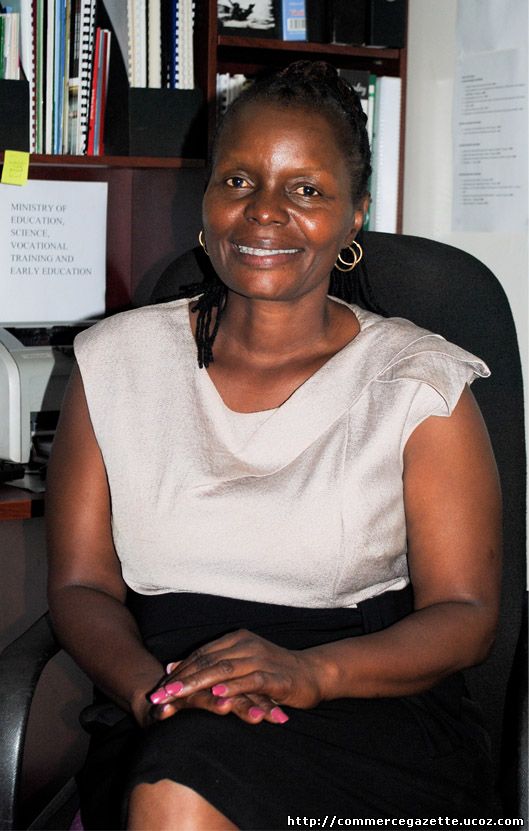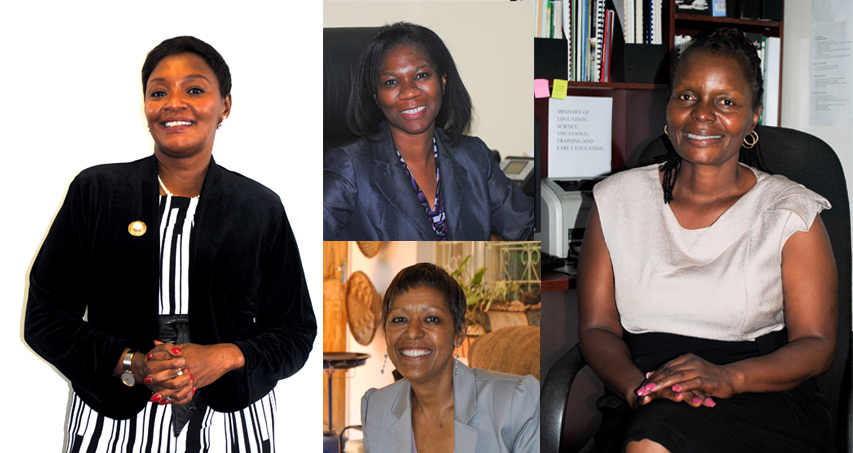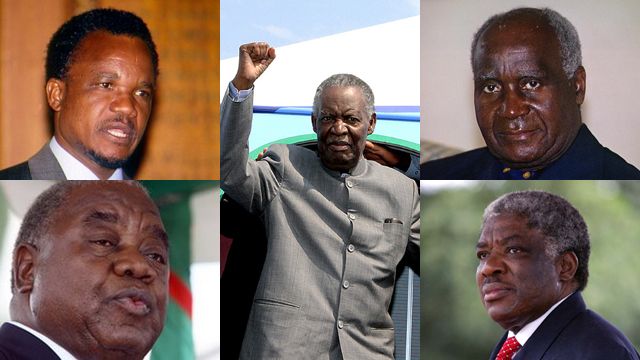 |
GAME Changer
|
|
Women are generally thought of as gatekeepers of a higher moral authority. Individually they remain marginalized, yet when women band together and speak up those who have dominated the scene always feel threatened. Judith Mulenga gives that delicate impression when you first meet her. But that is until she starts talking about her work. In no time you realize that she is a straightforward speaker, who doesn’t beat around the bushes and you are left in no doubt as to exactly where she stands on an issue. Judith has so much passion when she talks about children’s rights that you can’t help but realize that they really are close to her heart. You realize that Judith is full of energy, motivation and enthusiasm. She is a powerhouse who wants to get the job done. She is the executive director of the Zambia Civic Education Association (ZCEA), an organization set up in 1993 to promote democracy and justice in Zambia following the dawn of multiparty politics by protecting fundamental rights and freedoms. In 2002, ZCEA changed its focus to concentrate on children’s rights, in line with the United Nations and African Charter on; human and child rights, civil and political rights and on economic, social and cultural rights. Judith oversees of the organization’s day-to-day business matters, championing the fight for children’s rights by directing programs to tackle issues which help further their development. Trained as a teacher, Judith analyses state and national legislative action through the lens of an advocate, educating policy makers and others who work on issues pertinent to children. Judith advises on developments of children’s rights in the political arena, demystifying the political process and encourages the personal participation of parents, guardians, policy makers and other like-minded organizations countrywide and abroad, and of course children, themselves. It is worth noting that the Central Statistical Office 2012 Preliminary Labour Force Survey report shows that 57.5 percent of Zambia’s population are young children aged 19 and below. ‘They,’ Judith says, ‘are the majority citizens of this nation.’ Judith says, what’s more profound than their numbers is the realization that for the first time in the history of Zambia’s constitution making process, on the dawn of its 50th independence celebration, children’s rights were finally given special attention in the bill of rights by the technical committee drafting the Zambian constitution appointed by President Michael Sata. The contradiction of children having rights, despite being minors beholden to their parents or guardian, underscores the importance to respect every person and may explain why the United Nations Convention on the rights of the child is the most widely adopted human rights document in history. Zambia ratified the Convention on November 6, 1999 soon after reverting to multiparty democracy, a year after the UN general assembly adopted them on November 20, 1989. On November 29, 1991, the African Charter on the rights and Welfare of the child was adopted by the African Union and ratified by Zambia on December 10, 2008. It replicates many of the right in the convention but is more specific to the values and aspirations of African people Judith says. Since ratifying the convention 25 years ago, Judith says, the well being of children is not guaranteed because Zambia has not directly incorporated the convention into the domestic laws, policies and practices to protect the rights of children and to ensure their development. ‘There is a disparity between what is in the legal framework and the lived life of the children.’ This means that a child cannot rely directly on the provisions of UNCRC in court, although it does have some persuasive weight. ‘However, if children rights were in the constitution they are guaranteed.’ The full implementation of the UN Convention on the Rights of the Child is better served under a constitution. This is among the reasons why ZCEA joined the coalition of organisations working to secure a new constitution for Zambians. Judith says children are the most vulnerable and voiceless people in any society, even those born in high income nations, by virtual of being a child are dependent on adults for everything therefore their protection must be paramount. The insight by Nelson Mandela asking society to reflect on how it treats its children must be the preoccupation of everyone Judith says, but more so parents who are their immediate nurturers and government because its responsible for upholding everyone’s human rights. Zambia must reflect honestly on whether it’s doing its utmost to protect children’s total well being. Judith does not believe so, and points to recent high-profile cases of child abuse reported in the media where a musician unrepentantly defiled a school girl and another case where the father not only defiled his seven year daughter but had the audacity to ‘share’ her with his friend. ‘There is something sick about that. Society is full of child abuse where are our values? Children are seen as objects,’ she says. ‘There is a serious problem with the exposure of children to violence. Despite media reports, I am concerned about insufficient awareness and information on the ill-treatment and abuse of children, including sexual abuse, both within and outside the family, and the lack of measures and mechanisms to prevent and combat it consistently. Children in Zambia are abused with impunity on a daily bases because their parents and guardians are unaware that they are infringing on their rights Judith says. Name calling reduces children’s self-esteem and beatings affect their dignity and safety. ‘We had a focused discussion with the children and we ask them ‘in which place are you very safe?’ Where do you expect children to feel very safe? Home right? But they said at the church, ‘because there we are not beaten or shouted at’. The next safe place, they said was the streets. The last two were a home and schools. ‘The constitution is the law, but what is happening on the ground? We haven’t bothered to build a protective environment for children. The law is supposed to be accompanied by attitude change.’ Judith says government is suppose to promote the rights that the law protects as the primary duty bearer responsible for disseminating information to everyone as specified by Article 42 of the Convention. However, this responsibility is largely left to NGOs, who despite their limited resources to reach the whole nation, complement government efforts by holding forums on child protection in communities. ZCEA promotes children’s rights through Child’s Rights Clubs in schools and distributes, pamphlets, magazines and manuals for children, their teachers and facilitators, media interface .
The price of poverty - aint success The experience of growing up in Zambia today is very difficult, with children’s daily lives devastated by hardship, poverty and severe disadvantages that include the lack of sufficient food, education, health care and the ever rising costs of living, which is not helping the most vulnerable children and their families or even those earning the lowest incomes, Judith says. The inability for poor families to afford the basic food needs directly impacts on their children’s fundamental right to life Judith says and adds that with the maternal mortality ratio in Zambia at 591/100,000 live births, there is nothing to celebrate over the reduced mortalities recorded recently as deaths remain excessively high. This places Zambia seriously off track to achieve the Millennium Development Goal 5 (target is 162/100,000 live births). Poor children are at high risk and do not have timely access to the full range of quality services essential to their development. Judith says children must have access to high-quality early childhood development programs, the returns on which have been well documented and widely recognized. Children and their families must be assured their core needs will be met through access to a comprehensive safety net.
Children’s rights in the constitution - game changer The key issues at the heart of the constitution debate and the potential impact of the change it has to improve the lives of all children under 18, through securing the necessary reforms in Zambia’s laws, policies and services, which will help children escape poverty, improve everyone’s future quality of life and more so begin the journey to move low income children into the middle class thus achieving middle income status for Zambia. Really, there is no way that Zambia can become a middle income nation by 2030 if approx. 56% of the population (18 and below) hardly have their rights acknowledged by the constitution - the fundamental law of the land. As a consequence of the Banda decision, corporal punishment in prisons and schools were also repealed. We therefore have little to be smug about in Zambia in the arena of children’s rights, despite much more attention being accorded to them in recent years and several major improvements in education, health and law. Constitution making process - walk the talk As evidenced by the emotional debates, and outright defiance to government that patience is required in the constitution making process and that it is still committed to a referendum, the public appetite of the people for change and the enactment of a new constitution is also clear. The current constitution making process was an undertaking by government to fulfill the Patriotic Front party’s election campaign pledge that they would review the current 1996 amended constitution in 90 days. As President Michael Sata strives to make a mark in his first term, and overcome a widespread feeling of disappointment on past failed constitutional reform processes, on November 16, 2011 he appointed the technical committee on drafting the Zambian constitution to review the recommendations and draft constitutions of previous constitution review commissions in order to draft a constitution that would, not only reflect the wishes and aspirations of the people of Zambia, but also stand the test of time. During the constitution-making process, the committee was mandated to consult widely, with local and international experts. The participation of members of the public and stakeholders in the constitution-making process was done through various consultative fora and conventions, such as district consultative forum and provincial, sector groups and national conventions. Representing the child rights organisations Judith participated in the sector group conventions. ‘Our focus there is to see that children’s rights were included in the bill of rights.’ The demand to know why the constitution making process has stalled touches the raw nerves of some government officials who lash out and accuse NGOs of having hidden agendas. Such sentiments are not new and are expressed each time there are debates on national issues. The resistance and hostility within some government circles is obvious. However, our work is open, it is not hidden. It’s there out on the table. ZCEA produces annual reports with audited financial statements to account for all funds received from donors who facilitate our works. |
|


